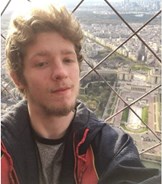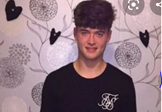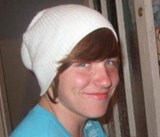Videos of family members and friends
Below are some powerful stories from family members and friends who have lost loved ones to accidental drowning.
Mums, friends, sisters, an uncle and a step-dad - whose lives have changed forever since losing a special person - have come together to help reach out to others in an attempt to stop them ever experiencing the same heartache as them. Each one of them has taken part in a short film to help keep people safe around open water.
Mark Allen
Leeanne Bartley is one family member who is working with us to share water safety messages. Her 18-year-old son, Mark Allen, drowned in Debdale Park in June 2018 after going into the water. Leeanne, her husband David, and Mark’s eldest sister, Lauren Allen, each shared their experiences of what it is like to lose a loved one to drowning and living without Mark.

Mark Allen
There was a police family liaison officer there, I think. And she just said, you don't need to do anything, we've got him. And I just said, what do you mean you've got him? And they said, we've got his body, we've recovered his body. And I just dropped to the floor. I don't remember anything after that, really, to be honest.
Especially as his big sister, I felt like I was there to protect him. I feel like I failed to that job. It's such a hole in our lives because he really was the most amazing young guy that you've ever met.
He had been with a group of friends, they were just out enjoying the sunshine. It was a glorious, hot, sunny day, the hottest day of the year that far, you know, the day it happened. And Mark decided... I think there was a girl there that he liked or she liked him and he just decided to, like, climb over the fence, basically. That was preventing the access and jumped in. I think what they said at the inquest, it was only about ten foot.
You don't realise it with water at all. It looks calm, doesn't it? You realise it at the sea sometimes when you see the waves smashing around, but you see calm water like this, you don't think much of it really. Seems pretty safe, but it's far from safe. Once you get in trouble, it's too late and there's not much you can do.
It's really not worth losing your life over. It's not worth your family go through the sort of pain that my family's been through. And it's just, honestly, just don't risk your life.
Paul Lawson
Natalie Lawson's 16-year-old son, Paul, drowned in June 2017 after he went swimming with his friends in Greenbooth Reservoir. It was a hot day and the teenagers thought it would be a good idea to go into the water to cool off. Natalie bravely shared her story with us to help raise awareness of just how dangerous open water, such as reservoirs, can be.

Paul Lawson
Paul’s friends – Ben Hough and Jordan Yates – also shared their stories of losing a close friend. The pair continue to warn people about the dangers of open water as they talk about how their lives changed forever.
I remember I was sat in the kitchen. I had a load of people around because they didn't believe it. And I was sat with CID and sat in the kitchen. And they get a phone call at about I think it was quarter past eight. They were only just getting his body out of the water and that's when I just broke down. And I knew that my life had changed forever because it's not just my life, he left a sister behind. She was eight at the time and to turn around to your daughter telling her that her brother is not coming home was the second-hardest thing I had to say, and I accepted my life. The first hardest thing was to accept that my boy wasn't coming back all because it was a hot day and it was fun and he thought he could handle the water and the water can handle anybody, nobody can handle the water. Seriously it was not worth it.
The feeling when it happened is indescribable. Like you can't put a word on it. He was a friend but you felt like you lost a family member. It's a lot harder than you think it is especially you only think it's water. And then the next minute, you're a friend down, you know what I mean? It's very, very hard...very hard...
Reservoirs and lakes are large bodies of water that never really warm up that much, even in the height of summer, and unfortunately, they increase in depth quite quickly. So as people go out into the water, you can quite quickly get out of your depth. And with that cold water, even if you're a strong swimmer, it can take your breath away. It can seize your muscles. It can stop you from swimming.
He lost his life too soon just because all of the boys wanted to have a bit of fun in the reservoir. It does take a big toll on your life, and as much as you're not going to think it is, it's... I've had good days, I've had bad days when I'll sit at home and I'll cry about it, but even on the good days, I'll still...you still have to have a minute to yourself and disengage from what everyone else is doing because he's meant to be there... It's just an empty feeling, it breaks you... I wouldn't wish like my worst enemy, literally. I wouldn't ever want anyone to go through what we've had to go through.
Jack Pullen
Chris Jordan is the uncle of Jack Pullen, who drowned in July 2016 at the age of 16 in the River Etherow in Broadbottom, near Hyde. Since Jack’s death, Chris set up the Jack Pullen Foundation, and more recently has developed interactive sessions on his website in a bid to educate more people about the dangers of open water.

Jack Pullen
Chris and Jack’s sister, Fallon, talk about how they lost Jack and the life-changing impact it had on their family.
The water might look inviting, but beneath the surface it is so much colder and stronger than what people think. And you could be the strongest swimmer in the world. Jack, unfortunately, wasn't a strong swimmer, but the water doesn't care if you're a strong swimmer or not. The water can be vicious and it can change in an instant, and it can just take you away like it took Jack from us.
Jack was not only my big brother, but he was my best friend.
Like, if you lose somebody to cancer or to an illness, you can prepare for that. But nobody can prepare you for losing somebody to the water. And Jack was a funny, young, bright young man. And he was just 16 years old. And he had his whole life ahead of him. And it was taken away from him, from us and from everybody who loved him and the pain is indescribable.
That hole will never, ever be filled. And I'd really like people to take that pain from us and to use it as a wake-up call and really teach themselves about water safety education because it's vital and knowledge is key to saving lives.
I know that nothing can break the bond that Jack and I had, and I'm so glad I got to share that with him because losing Jack was the worst thing and nothing can describe the pain. The emptiness doesn't go away. And like I said, it doesn't get any easier, but losing him was the hardest thing and life without him is harder. But missing him every day couldn't compare to either of those and I just don't want any families to have to go through the same.
So if you get the chance, just think. You don't want to put your family through this you don't want to lose your life. It's really not worth it. Might be hot and it might look appealing, but underneath it's not, it's really not. And you don't know what could happen. Anything could happen. You could never come home that day, and it's really not worth it.
Dylan Ramsay
Dylan Ramsay drowned on July 3, 2011 in a quarry near to Chorley, Lancashire, at 13-years-old. Dylan’s mum, Beckie Ramsay, has been campaigning to raise awareness of the dangers of open water since that time and has worked with us and Lancashire Fire and Rescue Service over the years.

Dylan Ramsay
Dylan was my eldest child. Born 17th of October 97. And when he was born, I made him a promise that I would look after him and protect him forever. Brilliant young lad, son to be proud of. He went to primary school, sailed through it, went to high school, become athlete of the school two years in a row, really physically fit and on track for getting As in his GCSEs so really really you know loving life.
On the 3rd of July 2011, I'd gone to a football match with one of my other children and basically received a phone call saying Dylan was in trouble at the quarry. My first thoughts were that he'd fallen, that maybe he'd have a broken bone. The water never really entered my head if I'm being totally honest, I was totally naive to it, totally uneducated about it, didn't have a clue.
We got to the quarry, my husband told me that my son had passed away. And I remember collapsing and I remember begging to be in that ambulance with Dylan. I was told that Dylan had been in the water for about 20 minutes with his friends, and I was told that he got into some kind of trouble and he was underwater for no more than three minutes.
The man that pulled Dylan out said had he been able to get to him 60 seconds earlier he could have saved his life. He was still stood up. I don't know how this happens, I don't know how we fix this. I just know that if I'd of knew then what I know now, my life would be totally different.
Tomorrow, it's going to be nine years since losing my first born child. And I still can't come to terms with that, that my son's never coming home. I still can't come to terms with the fact that my daughter cries herself to sleep. I still struggle with the fact that my son's reach out for the big brother and he's not there. And it's very much felt in the house that me and dad aren't the same mum and dad that we were before we lost Dylan because losing a child changes you and I don't really know what my messages are from being totally honest.
I just wish that I could put you in my shoes for one day so that you never have to live your life like this. I wish I knew about cold water shock. I wish I knew about undercurrents. I wish I knew about the water being stronger than people nine years ago. I didn't. How can you possibly teach something that you don't know?
We're very much a generation of people that are uneducated where water safety's concerned. And I genuinely believe that swimming in open water requires a skill set, it requires training, and it requires going to places that is safe, that lifeguards are on hand, that your safety is paramount, and adults are going around just jumping in rivers, lakes, quarries, reservoirs, and setting the example to our youth, our children of tomorrow, our adults of tomorrow, I should say, that it's okay to do that?
And actually it's not. So many children, teens and adults don't make it home after 20 minutes of swimming or a walk along the canal or a night out and they've taken a quick route home. I'm here to say it's not worth it. It's not worth getting in the water for a swim. It's not worth taking that shortcut home by the canal.
This is what's left behind. And I tell you something now, I know my son never ever wanted me to feel like this. He never went out to die that day. He went out for a bit of fun, just like thousands of you were doing every single day.




